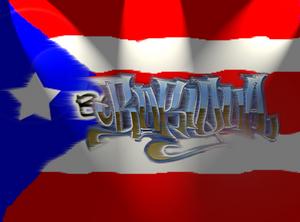After breaking and graffiti crash-landed in terms of mass-mediated popularity around 1985 following their brief but intense media-propelled flight, hip-hop became synonymous with the one art form that had from its inception been most intensely Black-identified namely, rap. Subsequent creative developments and mass-marketing strategies further intensified this identification.
Throughout its history, rap music has manifested different approaches to and articulations of Blackness. Explicit reference to Blackness in the early 1980's, though elaborated and displayed, were not omnipresent. The late 1980s and early 1990s, however, saw an explosion of Black Nationalist sentiment (12).
Louis, a Puerto Rican teenage rap fan during rap's Black Nationalist phase, recalls that when he first heard Public Enemy, it was like a revelation. He went straight to the library to look up this Huey Newton they were talking about. That's when it really hit him that they were talking about important Black historical figures and events. His first reaction to the information to which he was exposed was pride in "us Black people." But then it started dawning on him that he was not exactly Black, given the way Blackness was being formulated.
Puerto Ricans, though considered virtual Blacks for some purpose, are considered non-blacks for others. Within the U. S context, they have always had their ghetto nonwhite credentials up to date; their blackness, however, has been a different issue. So if hip-hop's mass-mediated popularity is closely connected to a romanticization/ exoticization of blackness.
Puerto Rican marginalization in rap has also been related to purist and narrow definitions regarding with is Black expressivity and what is Latino expressivity. Rap has been viewed as a new expression among a Black-music continuum and deemed as a breaking away from Latin music.
Rap presented similar problems form the perceived boundaries of Latino musical expression, as those that the Latin soul of the 1960s and early 1970s had presented (13). Though many of the critiques of Latin soul emphasized the musical inexperience of its musicians and it faddish qualities, much of the discomfort with this genre harked back to a deviation from tradition. Unflatteringly described by bandleader Willie Rosario as "American music played with Latin percussion," Latin soul violated the bound that kept district what was Black and what was Latino/Puerto Rican.
Hip hop's African Americanization to the exclusion of Puerto Ricans was not a product of circumstance. Neither can it be explained away by invoking only African American creative volition. The increasing Black identification of hip-hop must be understood within the steadfastness of ethno racial categories in this country. These categories translate into a perceived limited potential for transethnic cultural production, solidarity, and political organizing. Cultural hybrids such as hip-hop threaten those categories and the comforting, simplifying myths built around them.


